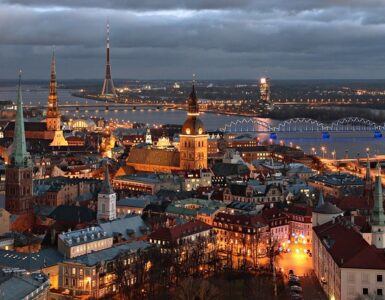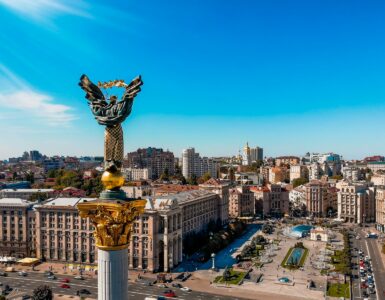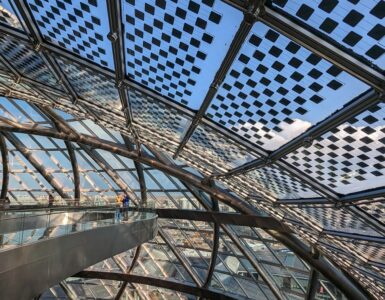EMERGING MARKETS
OurCrowd Global Investor Summit, one of the Middle East’s biggest tech conferences in the Middle East, returns this week after a three-year hiatus. This year’s theme is “Startups: Saving the Planet,” spanning topics like climate change, food and water insecurity, health access, pollution, supply chains and online security. [Source: OurCrowd]
TELEGRAM
Russia-born billionaire Pavel Durov, the founder of Telegram messenger, was recognized by newspaper Arab Business as the “most influential person of Dubai,” where he also moved the messenger’s headquarters. Durov has been resident of Dubai since 2017, was granted citizenship in 2021 and became the emirate’s richest person in late 2022. [Source: Kommersant]
TON Foundation announced TON Awards, a contest for developers that created projects to work on the Telegram’s blockchain, an initiative launched by Pavel Durov, which he then abandoned and handed over to a voluntary TON community. The contestants for the awards are open source and non-commercial working TON-projects launched in 2022. [Source: TON Community Rus]
RUSSIAN BUSINESSES IN THE UAE
A pizza restaurant of the Russian franchise Dodo Pizza in Dubai, the United Arab Emirates, started selling pizza cooked according to a recipe developed through ChatGPT. The move aims to help the restaurant opened in the middle of January 2023 establish its positions in a highly competitive pizza market in Dubai dominated by aggregators, not restaurant brands. [Source: RB]
Russian MTS Bank, a subsidiary of the country’s biggest mobile operator, has obtained a banking license in the United Arab Emirates making the bank the first foreign financial organization to get such a permission. The target audience of MTS Bank that managed to escape Western sanctions, is Russians who relocated from Russia amid political and economic crisis in their home country. [Source: Financial Times]
UKRAINE
USAID, Estonia and others show interest in Diia, a system for the administration of government and business services developed by the Ministry of Digital Transformation. USAID is among those who have allocated funding to the platform, as a part of the agency’s $60 million commitment to boost the country’s cybersecurity.
[Source: Ukraine Business News, InVenture]Drone dogfights: There is a growing number of drone-on-drone attacks, The Economist reports. A range of drone companies, both foreign and domestic, have been assisting Ukrainian forces in fighting off Russia’s aggression.
[Source: The Economist, VICE]Lemon, a marketplace that connects employers and developers, expanded its geography where it sourced developers after the start of the Russian aggression against Ukraine since “people didn’t want to hire Ukrainian developers because of the risk.” Before the war, Lenom’s founder Alexander Volodarsky told Icebreaker in an interview, 40% of developers had been from Ukraine, and now the geography expanded to 40 countries. [Source: Unicorn]
US-based SpaceX corporation acknowledged it has curbed capabilities of its provider of satellite Internet Starlink in Ukraine to make it available for humanitarian use only. There were reports previously that the Internet connection could be used for military purposes for tracking Russian military movements. [Source: BBC]
KAZAKHSTAN
A multilateral trading facility ITS will be launched in Kazakhstan’s capital Astana in next two months to allow Russian brokers and traders access to international trading, which is now closed for them due to sanctions. Shareholders of ITS are investment fund Foundation for the Support and Development of International Financial Center, fund Freedom Kazakhstan and St. Petersburg Exchange. [Source: Vedomosti]
Kazakhstan will get $1.43 billion in taxes from 2023 to 2028 as a result of the acceptance of the federal law on digital assets recently signed by the country’s President Kassym-Jomart Tokayev. $2 billion is going to be invested in equipment with nearly 5,000 jobs to be created, the government calculated together with business organizations. [Source: Bloqchain-Central Asia]
UZBEKISTAN
Five cryptocurrency companies in Uzbekistan paid $310 million in license fees to the country’s budget in 2022. At the moment, these five licensed companies include cryptocurrency exchange UzNEX and cryptocurrency exchangers Crypto Trade NET, Crypto Market, Crypto Express and Coinpay. [Source: Bloqchain-Central Asia]
Authorities of Uzbekistan and crypto exchange Binance have failed to reach an agreement on the exchange’s possible activity in the country. The reason is that the government is not satisfied with the fact that it will not be able to control peer-to-peer (P2P) trade at Binance. [Source: Bloqchain-Central Asia]
NOTABLE DEALS
Poland’s Plenti raised $5.3 million to expand its electronic device rental service, as more consumers are facing economic difficulties. [Source: PYMNTS]
Yandex is negotiating with Uber on purchase of 29% of shares in a Netherlands-based MLU B. V. company, a joint venture of Yandex and Uber that manages Yandex’s taxi business in Russia and other CIS countries. If the deal closes, Yandex will be a 100% owner of MLU, which Yandex has been pursuing since 2020 amid an increase in revenue from its “Mobility” sector. [Source: Forbes]Russian startup Host Theater, which organizes theatrical shows at five-star hotels, has raised $150,000 from business angels. The investments will be spent on expansion. The company is now operating in Dubai and plans to launch shows in other countries such as Turkey, Uzbekistan, Armenia, and Kazakhstan. [Source: RB]






Add comment